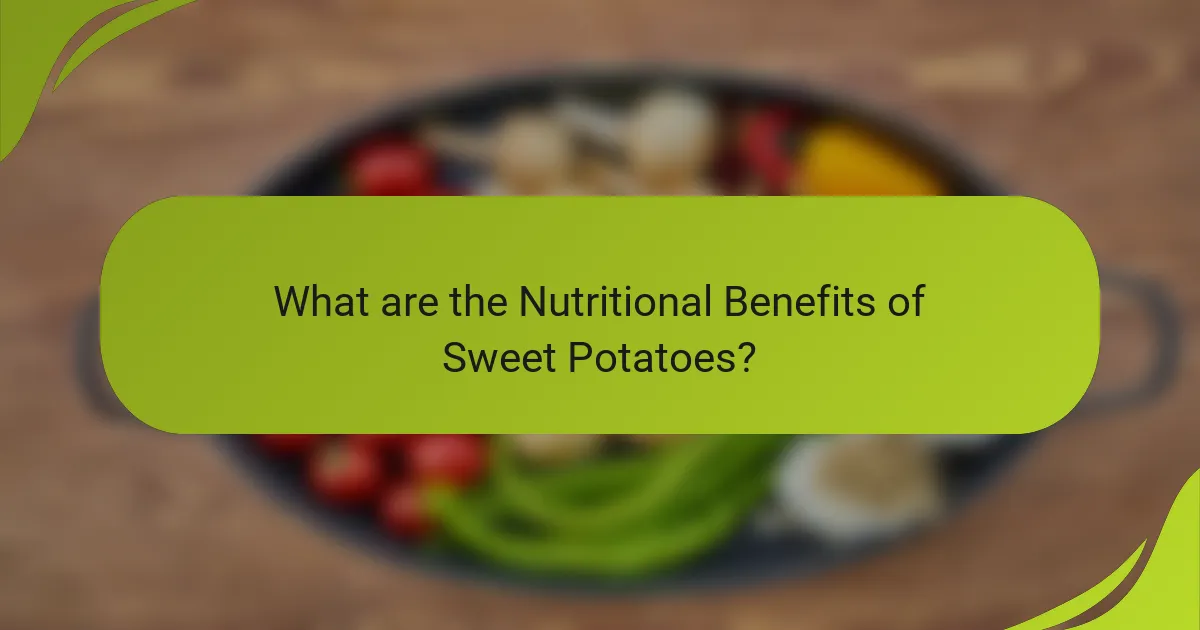Sweet potatoes are highly nutritious root vegetables known for their rich content of vitamins, particularly vitamin A and vitamin C, which support vision, immune function, and skin health. They are a significant source of dietary fiber, promoting digestive health and weight management, and contain complex carbohydrates that provide sustained energy while maintaining a low glycemic index for effective blood sugar regulation. The article explores various preparation methods, including baking, boiling, steaming, and roasting, each offering unique benefits while preserving the nutritional value of sweet potatoes. Additionally, it highlights the health advantages of sweet potatoes, such as their antioxidant properties and potassium content, which contribute to heart health and inflammation reduction.

What are the Nutritional Benefits of Sweet Potatoes?
Sweet potatoes are highly nutritious root vegetables. They are rich in vitamins, particularly vitamin A, which supports vision and immune function. A medium sweet potato contains about 400% of the daily recommended intake of vitamin A. Additionally, sweet potatoes provide significant amounts of vitamin C, which aids in collagen production and boosts the immune system. They also contain dietary fiber, promoting digestive health and helping to maintain a healthy weight.
Moreover, sweet potatoes are a source of complex carbohydrates, which provide sustained energy. They have a low glycemic index, making them a suitable option for blood sugar management. Antioxidants in sweet potatoes, such as beta-carotene, help combat oxidative stress in the body. Overall, their nutrient density makes sweet potatoes a beneficial addition to a balanced diet.
How do the vitamins and minerals in sweet potatoes contribute to health?
Vitamins and minerals in sweet potatoes significantly contribute to health. They are rich in vitamin A, which supports vision and immune function. Sweet potatoes also contain vitamin C, an antioxidant that aids in tissue repair and boosts immunity. Additionally, they provide potassium, which helps regulate blood pressure and supports heart health. The fiber content in sweet potatoes promotes digestive health and can aid in weight management. Research indicates that the antioxidants in sweet potatoes may reduce inflammation and lower the risk of chronic diseases. Overall, the combination of these vitamins and minerals makes sweet potatoes a nutritious addition to a balanced diet.
What specific vitamins are found in sweet potatoes?
Sweet potatoes contain several specific vitamins. They are particularly rich in vitamin A, which is essential for vision and immune function. Additionally, sweet potatoes provide vitamin C, important for skin health and antioxidant protection. They also contain vitamin B6, which plays a role in metabolism and brain health. Furthermore, sweet potatoes have vitamin E, known for its antioxidant properties. These vitamins contribute to the overall nutritional profile of sweet potatoes, making them a healthy food choice.
How do minerals in sweet potatoes support bodily functions?
Minerals in sweet potatoes support bodily functions by contributing to various physiological processes. They are rich in potassium, which helps regulate fluid balance and muscle contractions. Magnesium in sweet potatoes aids in energy production and protein synthesis. Calcium supports bone health and cellular functions. Iron is essential for oxygen transport in the blood. Zinc plays a role in immune function and wound healing. These minerals collectively enhance metabolic functions and maintain overall health.
Why are sweet potatoes considered a superfood?
Sweet potatoes are considered a superfood due to their high nutritional value. They are rich in vitamins A, C, and B6, as well as minerals like potassium and manganese. One medium sweet potato provides over 400% of the daily recommended intake of vitamin A. This vitamin is essential for eye health and immune function. Sweet potatoes also contain dietary fiber, which aids digestion and promotes gut health. Additionally, they have a low glycemic index, making them suitable for blood sugar control. The antioxidants in sweet potatoes, such as beta-carotene, help combat oxidative stress. These nutritional attributes contribute to their classification as a superfood.
What unique phytochemicals are present in sweet potatoes?
Sweet potatoes contain unique phytochemicals such as anthocyanins, carotenoids, and phenolic compounds. Anthocyanins are responsible for the purple color in some sweet potato varieties. They have antioxidant properties that may reduce inflammation and lower the risk of chronic diseases. Carotenoids, including beta-carotene, contribute to the orange color and are precursors to vitamin A. This vitamin is essential for vision and immune function. Phenolic compounds provide additional antioxidant benefits. Research has shown that these phytochemicals can improve overall health and may help prevent certain diseases.
How do sweet potatoes compare to other root vegetables in nutrition?
Sweet potatoes are nutritionally dense compared to many other root vegetables. They are high in beta-carotene, which converts to vitamin A in the body. A medium sweet potato contains about 400% of the recommended daily intake of vitamin A. In contrast, other root vegetables like carrots and beets provide lower levels of this nutrient.
Sweet potatoes also offer more fiber than many root vegetables. They contain approximately 4 grams of fiber per medium-sized potato, while potatoes provide about 2 grams. This higher fiber content aids in digestion and promotes satiety.
Additionally, sweet potatoes have a lower glycemic index than regular potatoes. This means they have a less significant impact on blood sugar levels. They provide complex carbohydrates that release energy slowly.
In terms of vitamins, sweet potatoes are rich in vitamin C and several B vitamins. They contain about 30% of the daily value for vitamin C per medium potato. Other root vegetables like turnips and parsnips have lower vitamin C content.
Mineral-wise, sweet potatoes are a good source of potassium, offering about 450 mg per medium potato. This is comparable to other root vegetables, but sweet potatoes also provide manganese, which is less common in many other types.
Overall, sweet potatoes stand out for their unique nutrient profile, particularly in beta-carotene and fiber, making them a beneficial addition to a balanced diet.

What are the Best Preparation Methods for Sweet Potatoes?
The best preparation methods for sweet potatoes include baking, boiling, steaming, and roasting. Baking sweet potatoes enhances their natural sweetness and creates a tender texture. Boiling is a quick method that retains moisture and is ideal for mashing. Steaming preserves nutrients and results in a soft, flavorful product. Roasting caramelizes the sugars, adding depth to the flavor. Each method offers unique benefits while maintaining the nutritional value of sweet potatoes, which are rich in vitamins A and C, fiber, and antioxidants.
How can sweet potatoes be cooked to retain their nutrients?
Sweet potatoes can be cooked using steaming, baking, or microwaving to retain their nutrients. These methods minimize nutrient loss compared to boiling. Steaming preserves water-soluble vitamins like vitamin C and B vitamins. Baking enhances flavor while maintaining nutrient content, especially when cooked with the skin on. Microwaving is quick and helps keep nutrients intact due to shorter cooking times. Research indicates that cooking methods significantly affect the nutrient levels in vegetables, with steaming being one of the best options for preserving vitamins.
What methods are best for boiling sweet potatoes?
The best methods for boiling sweet potatoes include whole boiling, cubing, and steaming. Whole boiling involves placing unpeeled sweet potatoes in a pot of water and boiling until tender. This method retains moisture and flavor. Cubing involves peeling and cutting sweet potatoes into uniform pieces before boiling. This reduces cooking time and ensures even cooking. Steaming sweet potatoes in a steamer basket over boiling water preserves nutrients and enhances flavor. Each method results in tender sweet potatoes suitable for various recipes.
How does roasting affect the nutritional profile of sweet potatoes?
Roasting sweet potatoes enhances their nutritional profile by increasing the availability of certain nutrients. The process caramelizes natural sugars, which improves flavor and sweetness. Roasting also reduces water content, concentrating nutrients like vitamins A and C. Studies show that roasting can increase antioxidant levels, making sweet potatoes more beneficial. For instance, a study published in the Journal of Food Science found that roasted sweet potatoes had higher antioxidant activity compared to boiled ones. Additionally, roasted sweet potatoes maintain a low glycemic index, which is favorable for blood sugar control.
What are some popular ways to incorporate sweet potatoes into meals?
Sweet potatoes can be incorporated into meals in various popular ways. They can be roasted, which enhances their natural sweetness and creates a crispy texture. Mashed sweet potatoes are another option, often enriched with butter or spices for added flavor. Sweet potato fries are a popular alternative to regular fries, providing a healthier option. Additionally, they can be added to soups and stews, contributing both nutrition and flavor. Sweet potatoes can also be used in salads, offering a hearty and colorful addition. Finally, they can be baked and served as a side dish, showcasing their versatility. Each method retains the nutritional benefits of sweet potatoes, including high fiber and vitamin A content.
How can sweet potatoes be used in savory dishes?
Sweet potatoes can be used in savory dishes in various ways. They can be roasted, mashed, or used in soups and stews. Roasting enhances their natural sweetness and creates a crispy texture. Mashed sweet potatoes can serve as a flavorful side dish, often seasoned with herbs and spices. In soups, they add creaminess and depth, complementing other ingredients. Sweet potatoes can also be incorporated into casseroles and salads. Their versatility allows them to pair well with savory flavors like garlic, onion, and spices. Nutritionally, they are rich in vitamins A and C, making them a healthy addition to meals.
What are some creative sweet potato dessert recipes?
Sweet potato dessert recipes include sweet potato pie, sweet potato brownies, and sweet potato cheesecake. Sweet potato pie combines mashed sweet potatoes with spices and a flaky crust. Sweet potato brownies use pureed sweet potatoes for moisture and a rich texture. Sweet potato cheesecake features a creamy filling made with sweet potato puree and cream cheese. These desserts leverage the natural sweetness of sweet potatoes. They provide a nutritious alternative to traditional dessert ingredients. Sweet potatoes are high in fiber and vitamins, enhancing the health profile of these treats.

What Health Advantages Do Sweet Potatoes Provide?
Sweet potatoes provide numerous health advantages. They are rich in vitamins A and C. These vitamins support immune function and skin health. Sweet potatoes also contain dietary fiber. Fiber aids in digestion and helps maintain a healthy weight. They have a low glycemic index, which can help regulate blood sugar levels. Antioxidants in sweet potatoes combat oxidative stress. Research shows that they may reduce inflammation in the body. Additionally, they are a good source of potassium, which supports heart health.
How do sweet potatoes support digestive health?
Sweet potatoes support digestive health primarily due to their high fiber content. A medium sweet potato contains about 4 grams of dietary fiber. This fiber aids in promoting regular bowel movements. It helps prevent constipation by adding bulk to the stool. Additionally, the soluble fiber in sweet potatoes can help improve gut health. It acts as a prebiotic, feeding beneficial gut bacteria. Studies show that a diet rich in fiber can reduce the risk of digestive disorders. Thus, incorporating sweet potatoes into your diet can enhance overall digestive function.
What role does fiber play in sweet potatoes?
Fiber in sweet potatoes aids digestion and promotes gut health. It helps regulate bowel movements by adding bulk to stool. This can prevent constipation and improve overall digestive function. Fiber also contributes to a feeling of fullness, which can aid in weight management. Additionally, it can help lower cholesterol levels and stabilize blood sugar. Sweet potatoes contain about 3 grams of fiber per 100 grams. This dietary fiber includes both soluble and insoluble types, each offering unique health benefits.
How can sweet potatoes help manage blood sugar levels?
Sweet potatoes can help manage blood sugar levels due to their low glycemic index. This means they release glucose slowly into the bloodstream. The fiber content in sweet potatoes also aids in stabilizing blood sugar levels. Fiber slows down digestion and absorption of carbohydrates. A study published in the Journal of Nutrition found that sweet potatoes improved insulin sensitivity. This effect is beneficial for individuals with type 2 diabetes. Additionally, sweet potatoes contain antioxidants that may contribute to better metabolic health. These properties make sweet potatoes a smart choice for blood sugar management.
What are the anti-inflammatory properties of sweet potatoes?
Sweet potatoes have notable anti-inflammatory properties. They contain antioxidants like beta-carotene and vitamins C and E. These compounds help reduce oxidative stress in the body. Studies show that sweet potatoes can lower inflammatory markers. For example, a study published in the “Journal of Nutritional Biochemistry” found that sweet potato extract reduced inflammation in animal models. Additionally, their high fiber content supports gut health, which is linked to lower inflammation levels. Regular consumption of sweet potatoes may contribute to overall reduced inflammation in the body.
How do antioxidants in sweet potatoes benefit overall health?
Antioxidants in sweet potatoes enhance overall health by neutralizing free radicals. Free radicals can cause oxidative stress, leading to chronic diseases. Sweet potatoes contain high levels of beta-carotene, which is a powerful antioxidant. Beta-carotene converts to vitamin A in the body, promoting eye health and immune function. Additionally, sweet potatoes are rich in anthocyanins, which have anti-inflammatory properties. Studies show that these antioxidants may reduce the risk of certain cancers and heart disease. Regular consumption of sweet potatoes supports overall well-being and longevity.
What studies support the health claims of sweet potatoes?
Research supports the health claims of sweet potatoes through various studies. A study published in the journal “Nutrients” by A. L. B. W. M. van der Meer et al. (2020) highlights the high antioxidant content in sweet potatoes. This antioxidant activity is linked to reduced oxidative stress, which may lower chronic disease risk. Another study in “Food Chemistry” by J. A. A. de Souza et al. (2019) found that sweet potatoes have anti-inflammatory properties. These properties can contribute to improved gut health and reduced inflammation. Additionally, research in “The Journal of Nutrition” by M. M. A. S. M. S. A. Alshahrani et al. (2021) indicates that the fiber in sweet potatoes aids in digestive health and weight management. These studies collectively reinforce the health benefits associated with sweet potato consumption.
What are some practical tips for cooking and enjoying sweet potatoes?
To cook and enjoy sweet potatoes, start by selecting firm, unblemished ones. Wash them thoroughly to remove dirt. You can bake, boil, steam, or roast sweet potatoes. Baking at 400°F for 45-60 minutes yields a sweet, caramelized flavor. Boiling takes about 20-30 minutes until tender. Steaming is a healthy method that retains nutrients. Roasting enhances sweetness and texture; cut into cubes, toss with olive oil, and roast for 25-30 minutes. Sweet potatoes pair well with spices like cinnamon, paprika, or garlic. They can be enjoyed as a side dish, in salads, or as a base for various toppings.
How can I choose the best sweet potatoes at the market?
Choose sweet potatoes that are firm and free from blemishes. Look for smooth skin without cracks or soft spots. The color should be vibrant, indicating freshness. Select medium-sized sweet potatoes for optimal flavor and texture. Avoid those that feel too heavy for their size, as they may be overly starchy. Sweet potatoes should have a slightly sweet aroma. These characteristics help ensure you are selecting high-quality sweet potatoes.
What are some common mistakes to avoid when preparing sweet potatoes?
Common mistakes to avoid when preparing sweet potatoes include not washing them properly. Sweet potatoes can have dirt and pesticides on their skin. Failing to wash can lead to contamination. Another mistake is overcooking them. Overcooked sweet potatoes lose their nutrients and flavor. Additionally, not using enough seasoning can result in bland taste. Sweet potatoes naturally have a sweet flavor that can be enhanced with spices. Using the wrong cooking method is also a mistake. Boiling can lead to nutrient loss, while baking retains more vitamins. Lastly, cutting them too small can cause uneven cooking. Larger pieces cook more evenly and maintain texture.
The primary entity of this article is sweet potatoes, a highly nutritious root vegetable known for their significant health benefits. The article outlines the nutritional advantages of sweet potatoes, including their rich content of vitamins A and C, dietary fiber, and antioxidants, which support immune function, digestive health, and blood sugar management. It also discusses various preparation methods, such as baking, boiling, and roasting, that help retain their nutrients. Additionally, the article highlights creative ways to incorporate sweet potatoes into meals and provides practical cooking tips to enhance their flavor and health benefits.